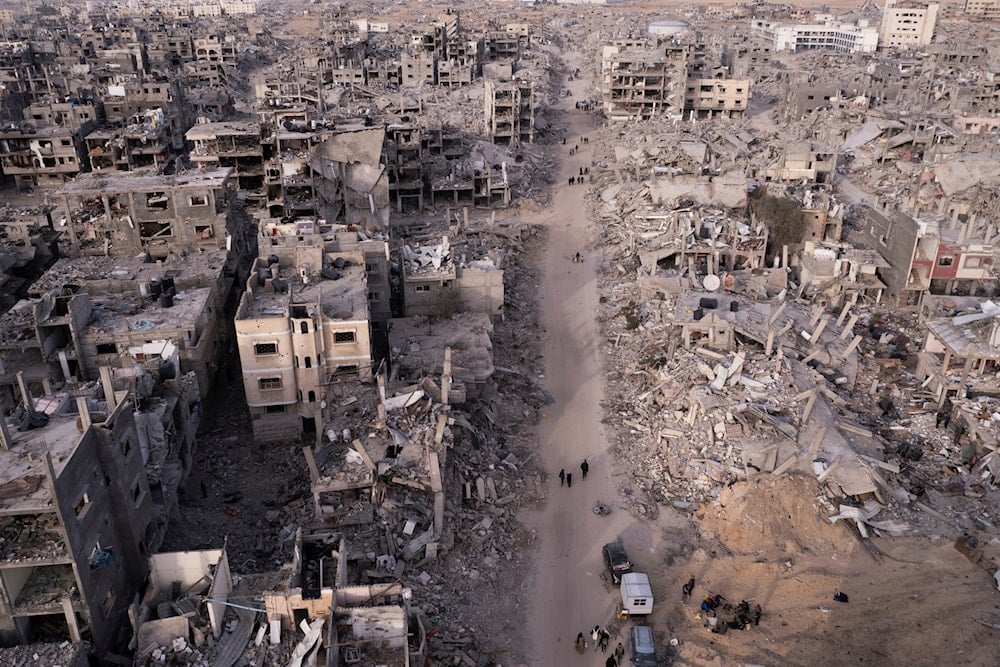If not expulsion, then 'interim relocation': Rubio's plan B for Gaza
Speaking during a visit to the Dominican Republic, Rubio urged other nations to contribute to Gaza’s rebuilding efforts but did not clarify whether Palestinians would be allowed to return.
-

An aerial photograph taken by a drone shows Palestinians walking through the destruction caused by the Israeli air and ground offensive, in Rafah, Gaza Strip, on Tuesday, January 21, 2025 (AP)
US Secretary of State Marco Rubio stated on Thursday that Gaza is currently "not habitable" due to threats, such as unexploded weapons - of course leaving out the part where it says that the weapons and ordnance scattered across the strip are Israeli - asserting that displaced residents of Gaza would need to "relocate" while the area undergoes reconstruction.
Speaking during a visit to the Dominican Republic, Rubio urged other nations to contribute to Gaza’s rebuilding efforts but did not clarify whether Palestinians would be allowed to return under US President Donald Trump’s proposed plan to "take over" the territory.
"I think that's just a realistic reality, that in order to fix a place like that, people are going to have to live somewhere else in the interim," Rubio said.
He added that Trump’s controversial remarks were aimed in part at encouraging other countries that "have both the economic and technological capacity" to help with rebuilding.
"President Trump has offered to go in and be a part of that solution. If some other countries are willing to step forward and do it themselves, that would be great, but no one seems to be rushing forward to do that," he said.
Rubio added that "countries in the region who express a lot of concern about the Palestinian people" should "find a solution and answer to their problem."
Meanwhile, Axios reported that Rubio is scheduled to visit the Middle East in mid-February, citing two Israeli officials and two other unnamed sources. His trip is set to follow the Munich Security Conference, which begins on Feb. 14 and will include stops in "Israel", the United Arab Emirates, and Saudi Arabia, with the possibility of additional destinations.
Calls for aid amid threats of ethnic cleansing
While some advocate for the ethnic cleansing of Gaza, others are pushing for urgent humanitarian aid and reconstruction efforts in the ravaged territory.
On Thursday, the United Nations World Food Programme (WFP) called on the international community and all donors to provide essential support for feeding millions of Gazans and rebuilding the war-torn region.
Since the ceasefire between "Israel" and the Palestinian Resistance took effect on January 19, the UN agency reported delivering over 15,000 tons of food, assisting more than 525,000 people. However, it stressed that significantly more aid is required.
"We call on the international community and all donors to continue supporting WFP's life-saving assistance at this pivotal moment," said Deputy Executive Director Carl Skau following a visit to Gaza.
"The scale of the needs is enormous and progress must be maintained. The ceasefire must hold," he emphasized in a statement.
Beyond food aid, Skau underscored the urgent need for action in other critical sectors, stating, "In critical sectors beyond food—water, sanitation, shelter, even getting children back into school—we need to work together. This requires funding."
The WFP also highlighted the importance of restoring self-sufficiency for Gazans through reviving commercial markets and local food systems, such as farming and fishing.
Skau's visit coincided with ongoing negotiations between "Israel" and Hamas on the second phase of the ceasefire agreement, which has temporarily halted 15 months of intense Israeli aggression.
Read more: Gazans to confront displacement; US must be isolated: Exclusive

 3 Min Read
3 Min Read










